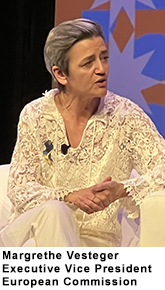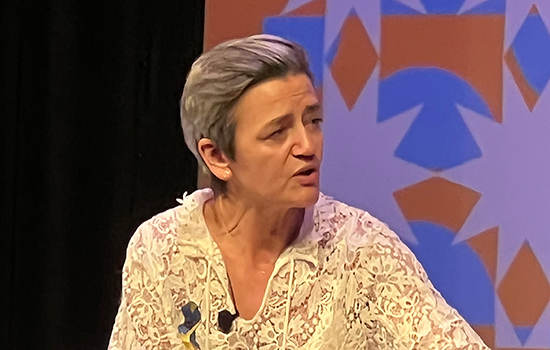In an hour-long interview at South by Southwest in Austin, Texas, Margrethe Vestager, Executive Vice President of the European Commission, offered the European regulator view on technology in the 21st century.
Though her purview does not necessarily cover cryptocurrency as CNBC interviewer Sara Eisen pointed out, Vestager did chime in on blockchain and non-fungible tokens (NFTs), specifically.
She signaled hopeful curiosity:
“The NFT is a new thing. I find it really interesting because, first of all, it questions everything you know about value. And second, maybe it’s a new way for artists and musicians and to get a stronger bite of the value that they create? And that obviously is really interesting. So we follow [it], but it takes us a bit of time because we start to recruit new people [at the European Commission] – not every lawyer is a gamer (jokingly). We need to get more people on board.
I had a very interesting experience because I had at a group of three people advising me during the last mandate when we were preparing the Digital Markets Act. It was a lawyer, an economist and a technologist. To see the three of them working together was really interesting because it took them some time to get used to it. But then once they did, what they achieved was really interesting.”
On tech regulation momentum coming from Washington DC
“I have noticed a change. When I was going up to The Hill with my first case under my arm they were like, “What’s that woman doing?” From there to now and the alignment that we feel today – so much has happened. And if you look at what people seem to think about big tech, social media – that kind of stuff – here things have changed quite dramatically. If you ask people in Europe and people here, you’d see that – on a bipartisan way – they think more or less the same. That technology is great, but we also need regulation.
…We have a different tradition in Europe, we’re not afraid of regulation. We’re not afraid of stepping into saying well, (…) see what what [regulation] can actually do.
And of course, there are different cultures. There are different democratic ways of doing things. But I don’t see that we can get to where we want to go… for instance, having such a simple thing as an open contestable market [is not possible] if we’re not willing to regulate.
I’ve been traveling in the US for the last 30 years and one of the things that always is really strong is the belief in every individual, every human being – the integrity of everyone. And I don’t understand why it was Europe that had the first “go” of privacy. Coming from the outside, it’s such an obvious thing in the US: without integrity, without respect of each and every one then privacy ought to be [respected] -at least GDPR or a version of it, and yet Europe was first. The way a smaller business is cherished and encouraged [in the U.S., one would think the U.S.] would make sure that the market is open and contestable -that ought to be a fundamental U.S. idea.”
The latest on the EU’s Digital Services Act and the Digital Markets Act
 “The aim on the Digital Markets Act is really simple: make sure that markets are open and contestable. So your success depends on your idea, your work ethic, your funding, getting to your customer – and that it will not depend on someone else and what we would call a gatekeeper. It’s you who can actually make it as an innovator, an entrepreneur, as a business.
“The aim on the Digital Markets Act is really simple: make sure that markets are open and contestable. So your success depends on your idea, your work ethic, your funding, getting to your customer – and that it will not depend on someone else and what we would call a gatekeeper. It’s you who can actually make it as an innovator, an entrepreneur, as a business.
The Digital Services Act makes sure that what is illegal offline is also be seen and dealt with as illegal online…. If you have a platform you need to know your business customer so you know that if there is a problem, you can take the responsibility – if it’s bad quality or harmful substances or there’s another problem such as it’s fake.
… But, I think for me with social media, the most important thing is that platforms will be obliged to do some sort of recourse through social risk assessments. Can my services be abused to undermine democracy? Can my services be abused or are they in themselves a mental health risk? Because I think that these are some of the things that we’re all struggling with. Is this healthy for us or is there a trade-off between profit and health? And if that is the trade off, it’s not always for the benefit of good health?
Vestager indicated she hoped that the Digital Markets Act could be implemented in Europe on January 1, 2023 with the Digital Services Act following in Q2 2023.

